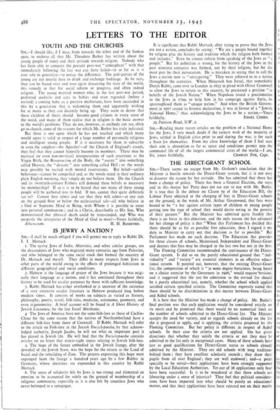LETTERS TO THE EDITOR
YOUTH AND THE CHURCHES
SIR,ŌĆöI should like, if I may, from towards the other end of the human span, to endorse all that Mr. Theodore Barker has written about the young people of today and their attitude towards religion. Nobody who has been able to compare the present post-war " atmosphere" with that immediately following the last war can have failedŌĆöin so far as it is ever safe to generaliseŌĆöto notice the difference. The pub-parties of the young are not merely here to drink and exchange badinage. As he says, they can be found over and over again discussing the state of the world, this remedy or that for social reform or progress, and often indeed religion. The young married women who, in the last post-war period, preferred cocktails and cars to babies and even regarded (before it arrived) a coming baby as a positive misfortune, have been succeeded in this by a generation that is welcoming them and apparently wishing for as many as they can decently bring up. They seem to desire that these children of theirs should become good citizens in every sense of the word, and many of them realise that in religion is the basic answer to the world's problems. They do not, however, as anybody can see, often go to church, some of the reasons for which Mr. Barker has truly indicated.
But there is one upon which he has not touched and which many would agree is valid in respect of a large number of personally religious and intelligent young people. If it is necessary for them to subscribe to even the simplestŌĆöthe Apostles'ŌĆöof the Church of England's creeds, they feel that they cannot honestly become its members. There may be mystical (or even non-mystical) interpretations of such assertions as the Virgin Birth, the Resurrection of the Body, the " ascent " into something called Heaven, the " descent " into something called Hell ; or the words may possibly be recited with mental reservations. But beliefŌĆöunlike behaviourŌĆöcannot be compelled and, as the words stand in their ordinary plain English meaning, they simply do not believe them. Do the Church and its twentieth-century Fathers still demand these beliefs as necessary for membership? If so it is to be feared that not many of these young people will be gathered into its fold. If not, cannot they quite definitely say so? Cannot they admit and say that they will admitŌĆöat any rate on the ground floor or below the ecclesiastical saltŌĆöall who believe in a God or Supreme Mind or Being, with Whom it is possible to enter into personal communion ; and in a Christ, describable as His Son, Who demonstrated that physical death could be transcended, and Who was uniquely the interpreter of the Mind of God to men?ŌĆöYours faithfully,


























 Previous page
Previous page